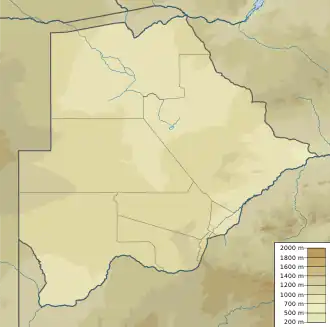Motloutse River
The Motloutse River is a river in Botswana, a tributary of the Limpopo River. The catchment area is 19,053 square kilometres (7,356 sq mi).The Letsibogo Dam on the Motloutse has been built to serve the industrial town of Selebi-Phikwe and surrounding local areas, with potential for use in irrigation.[1]
| Motloutse River | |
|---|---|
| Location | |
| Country | Botswana |
| Physical characteristics | |
| Mouth | |
• coordinates | 22.225488°S 29.017614°E |
| Basin size | 19,053 km2 (7,356 sq mi) |

Ecology
A field survey of the region in January 1989, before the dam was built, recorded 120 species of birds, mostly small insectivores. A relatively large number of water birds were found due to the presence of permanent pools on the Motloutse river downstream from its confluence with the Letlhakane river. The species of bird were generally typical for the region.[2] Before the dam was built, five or more pioneer fish species would migrate upstream from the Limpopo River into the Motloutse River during floods. The Letsibogo dam was expected to support a permanent fish population similar to that of the Shashe Dam.[3]
Water resource
Mean annual precipitation is 430 millimetres (17 in), while mean annual potential evapotranspiration is 2,000 millimetres (79 in).[1]Due to this difference, the river is an ephemeral sand river with surface flow only during the rainy season.[4]Rainfall is also highly variable, with rains of under 40% of the average expected one year in seven. [5]Mean annual runoff is 111,000,000 cubic metres (3.9×109 cu ft).[1]
Mineral resources
Gold mining along the Motloutse and Limpopo rivers started around 1200 CE, about the time that Great Zimbabwe rose to become a regional power. [6]Gold was found in 1860 in the old workings near Francistown, to the north of the river, causing the first small gold rush in Africa. [7]The first authenticated diamonds to be found in Botswana were three small stones discovered in 1959 by the Central African Selection Trust in gravels in the Motloutse River near Foley Siding. The team that found the diamonds examined the river up to its headwaters, but found no likely source. In 2004, geologist Leon Daniels identified a warp in the Earth's crust stretching from Bulawayo in Zimbabwe to the south of Botswana. He speculated that before the warp formed, the Motoutse river could have risen much farther to the west. Eventually, he found the huge Orapa kimberlite.[8]
References
Citations
- FAO Subregional Office ... 2004.
- Bevanger 1994, p. 11.
- Bevanger 1994, p. 12.
- Bevanger 1994, p. 3.
- Bevanger 1994, p. 10.
- Denbow & Thebe 2006, p. 27.
- Denbow & Thebe 2006, p. 29.
- Daniels 2004, p. 31.
Sources
- Bevanger, Kjetil (December 1994). The North-South Carriér Water Project in Botswana (PDF). Trondheim. ISBN 82-426-0531-9. Retrieved 2012-09-17.
{{cite book}}: CS1 maint: location missing publisher (link) - Daniels, Dr Leon (September 2004). "First diamonds in Botswana". Rough Diamond Review. Retrieved 2012-09-17.
- Denbow, James Raymond; Thebe, Phenyo C. (2006). Culture And Customs of Botswana. Greenwood Publishing Group. ISBN 978-0-313-33178-7. Retrieved 2012-09-17.
- FAO Subregional Office for Southern and East Africa Harare (2004). "Drought impact mitigation and prevention in the Limpopo River Basin". FAO. Retrieved 2012-09-17.